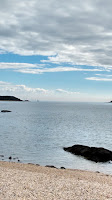I think I might have slept in
Victoria Beckhams bed last week, but I don’t know. It’s not because I had too
much to drink or my memory is failing me, it’s simply I don’t know which bed she
was sleeping in when David Beckham proposed to her back in 1998. Last week
I stayed at the same hotel where the proposal was made. I was at the
Rookery Hall, in Nantwich, with our team of Associate Deans on a 2 day team
development and planning event. The Associate Dean’s team is a relatively new
group, and have only been together for some 9 months.This was the first
time we had been able to spend some time together focusing on ourselves as a
team rather than on work issues.
It was a grand building and a
wonderful setting for some team building. Mobile phone signals were almost
non-existent and after trying half a dozen times to get a signal, we all gave
up and accepted the lack of contact with the outside world. Our time together
was facilitated by a couple of very experienced consultants from Lois Burton.
They skilfully enabled us to explore our shared values, roles and ways of
working with each other. It certainly wasn't always an easy journey of
discovery, and of course it was only a start.
Now some people have been known
to comment on my tendency to use my blog as an excuse to indulge in being a
restaurant critic, usually being less than complimentary on the food I have
been offered. The good folk at Rookery Hall genuinely surprised me with both
their service and the food served. At the evening meal, none of the team felt
like a sweet, so we ordered a cheese board for 6 and when it came it was
superb. Unlike the journey home which due to the Friday evening traffic, was
very long and tiresome.
It was the second time in a week I had found myself stuck in traffic.
Wednesday evening I travelled back from Chester, and the journey was just as
bad. However, as it was the 23rd I raised a glass of
champagne in celebration and memory of my younger brother Christopher, who died 8 years ago.
Christopher was at one time a landlord of pub in Kent, and he knew a great deal
about alcohol (my Mother would probably say he was too familiar with the demon
drink). What I didn't know was that there are 1 million bubbles in a glass of champagne. Gerard Liger-Belair, publishing his research in the Journal of Physical
Chemistry, has come up with a new way of calculating the number of bubbles. It’s
something to do with the tilt of the glass, the temperature of the champagne
and something called 'bubble dynamics'. Mind you, Gerard says you only get a
million bubbles if you don’t drink any of the champagne.
I had a reason for travelling
back from Chester in the Wednesday rush hour. Along with my University
Management Team colleagues, I had spent the previous 2 days contributing to the
thinking that will bring our University strategic planning objectives to life. I have to say, apart
from it being hard work, the teamwork was brilliant. I really like being in the
company of enthusiastic and creative colleagues all committed to producing
something new, something good.
Whilst the recently published Dowling
Review into the way universities partner and collaborate with business and
industry helped structure our thinking, the University of Salford has a long tradition
and history of undertaking research and other scholarly activity which has a
real world impact. Much of this research is undertaken in partnership with industry.
Last year, across our School, we secured £2 million in research funding, all of
which has been for projects aimed at delivering real world solutions in health,
social care, the criminal justice system, as well as in the social sciences, and
the arts and humanities.
Its Sunday, and the start of new week. Last week our new students started and I got to welcome them all to the School and the start of their personal journeys of discovery. As it is Sunday I am looking forward to doing something different and not work related, work stuff will have to wait until tomorrow. But maybe, if there is a spare moment or two
today, I might do some desk-top research and search the internet to see if I
can find which bedroom Posh Spice slept in all those years ago…
...and last nights England versus Wales rugby match provides a great case study as to the importance of effective team working... ...what a result!
...and last nights England versus Wales rugby match provides a great case study as to the importance of effective team working... ...what a result!





















